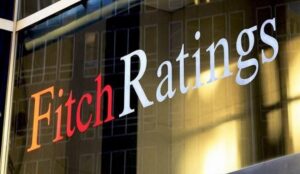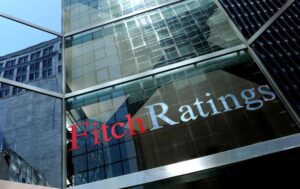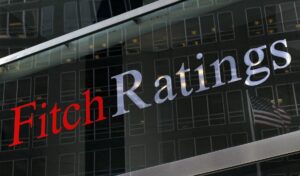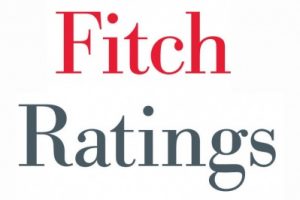
The international rating agency Fitch Ratings has upgraded the VR of ProCredit Bank (Kyiv) from ‘cc’ to ‘ccc-‘ and affirmed its Long-Term Foreign-Currency Issuer Default Rating (IDR) at ‘CCC-‘ and its Long-Term Local-Currency IDR at ‘CCC’.
“The upgrade reflects our view of ProCredit Bank’s moderately lower risk of failure, driven by stronger asset quality and profitability due to a less severe operating environment than previously expected,” the agency said in a statement on its website on Friday.
It added that the affirmation of the national long-term rating at ‘AA(ukr)’ with a ‘Stable’ outlook reflects the bank’s continued creditworthiness in the local currency relative to other Ukrainian issuers.
Fitch noted that ProCredit Bank’s IDRs are backed by the support of its parent ProCredit Holding AG & Co. KGaA (‘BBB/Stable Outlook’/bbb).
The agency added that the ‘ccc-‘ shareholder support rating reflects the view of the strategic importance of the Ukrainian bank for the holding, as well as potential limitations on the bank’s ability to use the parent company’s support, in particular, to service foreign currency liabilities.
It is noted that a default on priority foreign currency liabilities remains a real possibility due to the war, however, the bank maintains generally adequate foreign currency liquidity compared to its needs, which is facilitated by various capital and currency control measures introduced since the beginning of the war.
According to Fitch, ProCredit Bank will continue to service its external obligations: at the end of the first quarter of 2023, its external debt stood at a moderate 10% of total funding, consisting of EUR20 million of subordinated bonds and funding from international financial institutions.
The agency noted that the gradual improvement in the operating environment for Ukrainian banks has resulted in a more resilient loan portfolio quality for ProCredit Bank, as well as higher revenues and profitability than previously expected. As a result, although capital risks remain very high, Fitch believes that the bank is now less likely to face a material capital shortfall.
The agency recalled that ProCredit Bank’s asset quality indicators deteriorated sharply after the outbreak of the war, resulting in significant provisioning charges (3.4 times operating profit in 2022). “Risks to asset quality remain elevated and dependent on the outcome of the war, despite an improved operating environment in the first quarter of 2023,” Fitch stated.
It added that the bank earned UAH 211 million in net profit in the first quarter of this year after a net loss of UAH 1.8 billion in 2022, and expects an improvement in provisioning.
It is noted that the bank managed to increase its core capital ratio from 9.6% to 11.7% in the first quarter, but it remains modest.
ProCredit Bank was ranked 15th among 65 operating banks in Ukraine in terms of total assets (UAH 39.21 billion) at the beginning of June. Its net profit for the five-month period amounted to UAH 384.43 million.

The international rating agency Fitch Ratings has affirmed the long-term issuer default rating (IDR) in foreign and national currencies and the senior unsecured rating of Metinvest Mining and Metallurgical Group at ‘ССС’, the recovery rating is ‘RR4’.
“Metinvest’s ratings reflect the company’s sufficient funding over the next six months, supported by cash flow generation from its international asset base, few significant short-term maturities and existing cash position. This also reflects increased operational risk for the company following the military invasion Russia to Ukraine, including the occupation or damage of some of its assets, as well as severe logistical restrictions,” Fitch explained in a press release on Tuesday.
At the same time, it is noted that about a third of the company’s EBITDA in 2022 will be generated by its international assets.
The ‘CCC’ rating reflects Metinvest’s increased operational and financial risks. Ferrexpo plc has a higher ‘CCC+’ rating due to its lack of financial debt. Metinvest’s business profile benefits from upstream assets outside of Ukraine, maintaining its rating above Interpipe Holdings plc (CCC-), whose assets are wholly concentrated in Ukraine,” the agency explains.
Analysts predict that Metinvest’s sales will be around 50% of 2022 levels, with a gradual recovery between 2023 and 2025.
In addition, experts suggest that Metinvest will be considered an operating company in the event of bankruptcy and will be reorganized, but not liquidated.
According to analysts, Metinvest has limited liquidity: the company keeps most of its cash in offshore zones. The company continues to generate significant cash flows from its coal assets in the US, as well as its steel mills in Europe, and its iron ore and steel assets in Ukraine. This has helped offset the outflow of working capital in recent months.
Metinvest has minor upcoming maturities in 2022: its next significant maturity is $176 million due in April 2023 in connection with the redemption of its bonds, according to a press release.
As Yury Ryzhenkov, general director of Metinvest, said, the company is servicing its credit obligations, including Eurobonds, and intends to continue doing so in the future.
“We have not declared force majeure on debt. Unlike many Ukrainian issuers, we continue to service our entire loan portfolio, including planned payments on Eurobonds. And I think that we should have enough strength to do this,” he said. he.
Metinvest is a vertically integrated group of mining and metallurgical enterprises. Its enterprises are located in Ukraine – in Donetsk, Lugansk, Zaporozhye and Dnepropetrovsk regions, in European countries. In particular, in Bulgaria there is a Promet Steel plant with a capacity of 500 thousand tons of rolled metal per year, in Italy – Metinvest Trametal and Ferriera Valsider with a total capacity of 1.2 million tons per year. In the UK, the company owns the Spartan UK plant, which can produce 200 thousand tons of rolled steel per year.
The main shareholders of the holding are the SKM group (71.24%) and Smart Holding (23.76%), which jointly manage it.
Metinvest Holding LLC is the management company of the Metinvest group.

The international rating agency Fitch Ratings has downgraded its global economic growth forecast for 2022 to 2.4% from 2.9% expected in June.
“The European gas crisis, high inflation and a sharp acceleration in the pace of tightening of monetary policy in the world entail serious consequences for the economic outlook,” the updated Global Economic Outlook (GEO) said.
The global GDP growth forecast for 2023 has been lowered to 1.7% from 2.7%.
The eurozone and UK economies will fall into recession as early as this year, while the US will face a mild recession in mid-2023, Fitch predicts.
Eurozone GDP, according to the agency’s new forecast, will decrease by 0.1% in 2023 due to the consequences of the gas crisis (in June, an increase of 2.1% was expected).
The new forecast takes into account the complete or almost complete cessation of pipeline gas supplies from Russia to Europe. Fitch experts note that, despite the EU’s attempts to find alternative sources of supply, the supply of gas in the region will be significantly reduced in the near term, which will affect the industrial sector.
The growth forecast for the US economy for the current year has been worsened to 1.7% from 2.9%, for 2023 – to 0.5% from 1.5%.
“The recovery of the Chinese economy is constrained by quarantine restrictions and a downturn in the real estate market, and therefore we expect China’s GDP to increase by 2.8% in 2022 and grow by 4.5% next year,” Fitch said in a review. In July, the growth of the Chinese economy was predicted by 3.7% and 5.3%, respectively.
High and persistent inflation and rising inflationary expectations are forcing the Federal Reserve (Fed), the Bank of England and the European Central Bank (ECB) to become more hawkish in recent months, Fitch said. The base interest rates of the world’s leading central banks are rising at a much faster rate than one might expect.
According to Fitch’s forecast, the Fed will raise the rate to 4% by the end of this year and keep it at this level throughout 2023, while the ECB will bring the lending rate to 2% by December of this year. The base rate of the Bank of England will reach 3.25% by February 2023, agency experts believe.

The international rating agency Fitch Ratings has raised the long-term foreign currency issuer default rating (IDR) of JSC Ukrzaliznytsia (UZ) from “C” to “CC”.
The rating action follows Fitch’s upgrade of Ukraine’s sovereign ratings to ‘CC’ on 17 August 2022. This rating action has a direct impact on UZ’s IDRs as it is considered a state-related entity.
It indicates that the strategic importance of the company for the state increased after the start of the Russian-Ukrainian war in February 2022. Government incentive to support UZ remains strong, with the state providing non-refundable cash grants (UAH 10 billion) to support the company’s core operations. However, EP’s financial resources and cash flows depend more than before the war on the financial performance of the Ukrainian state, the agency also believes.
The rating action did not affect UZ’s standalone credit profile at ‘ccc’.
UZ’s Eurobond ratings are in line with its Long-term foreign currency IDR. Fitch clarifies that Eurobonds accounted for 75% of EP’s debt at the end of 2021.

Fitch Ratings has affirmed Ukraine’s Long-Term Foreign-Currency Issuer Default Rating (IDR) at ‘B’ with a stable outlook, the agency said on its website.
“Ukraine’s ‘B’ IDRs reflect its track record of multilateral support and a credible macroeconomic policy framework that has underpinned a relatively high degree of resilience to the coronavirus shock. Ukraine’s human development indicators compare favorably with the peer group, it has a net external creditor position of close to 13% of GDP, and general government debt is somewhat lower than the ‘B’ median. Set against these factors are weak governance indicators, a high degree of legislative and judicial risk to policy implementation, and low external liquidity relative to a large sovereign external debt service requirement,” the report says.
“The stable outlook reflects expectations for gradual fiscal consolidation and continuation of macroeconomic policies that helped preserve broad stability in external finances during last year’s shock. The ability to issue eurobonds and available domestic liquidity has provided some limited space to manage a delay over the next six months in completing the first review of the IMF Stand-By Arrangement (SBA). The coronavirus shock temporarily reversed improvements made in recent years in terms of a declining debt burden and normalization of growth prospects after the 2014-2015 geopolitical and economic crises. At the same time, the political position of the administration has weakened somewhat and recent Constitutional Court policy reversals further underline the risks to SBA compliance, which constrain the rating,” according to the document.

Fitch Ratings has affirmed Ukraine’s Long-Term Foreign-Currency (LTFC) Issuer Default Rating (IDR) at ‘B’ with a stable outlook, the rating agency said on its website.
“The ratings of Ukraine reflect its credible macroeconomic policy framework that had lowered inflation and narrowed fiscal deficits prior to the coronavirus shock, and a record of multilateral support. These strengths are set against low external liquidity relative to high financing needs associated with large sovereign debt repayments, a vulnerable, albeit improving, banking sector, and weak governance indicators. The coronavirus shock has at least temporarily reversed Ukraine’s improvements made in recent years in terms of a declining debt burden, normalization of growth prospects after the 2014-2015 geopolitical and economic crises, and reduced growth volatility,” it said.
“Ukraine’s new IMF program has been designed to reduce financing constraints and support a recovery in international reserves. Ukraine received the first tranche ($2.1 billion) under a $5 billion 18-month Stand-By Arrangement (SBA) for budget support in June. The sovereign also issued a $2 billion eurobond in July. Easing of external-financing constraints allowed the sovereign to buy back external bonds maturing in 2021-2022 and to repurchase close to 10% of its outstanding GDP warrants,” the report says.
“Fitch estimates that Ukraine has met close to 68% of its 2020 fiscal financing needs of $23.5 billion ($14.2 billion in amortizations including debt prepayments). Fitch expects one additional disbursement from the IMF SBA ($700 million) and the first tranche of a new EUR1.2 billion loan in 2020. Available domestic liquidity and government cash holdings provide room to accommodate remaining financing requirements, which in turn are dependent on the pace of expenditure implementation. Domestic banks, most notably state-owned, have increased exposure to government debt, as foreign investors have reduced their share of domestic government bonds by about $1.5 billion since February to 16% (not including National Bank of Ukraine, NBU, holdings),” according to the document.
“International reserves rose to $29 billion at the beginning of September, due to central bank FX purchases (net $1.2 billion YTD in 2020) and external financing. We expect international reserves to finish 2020 at $27.4 billion or 4.5 months of current external payments (CXP), slightly above the projected 4.1 months for the ‘B’ median. In our forecast for a gradual return of the current account deficit and continued access to external financing, reserve coverage will average 3.8 months of CXP in 2021-2022. External liquidity, measured by the country’s liquid external assets-to-liquid external liabilities, will rise to 112% for 2021, close to the 118% forecast for the ‘B’ median,” it reads.
“External financing needs have declined compared with previous years (35% of international reserves) in spite of large debt repayments, reflecting higher international reserves and a projected current account surplus (2.5% of GDP) in 2020, due to fairly resilient exports and remittances, sharp decline in imports and improved data availability on reinvested earnings by foreign investors. External financing needs will rise in 2021-2022 with the return to a current account deficit (reaching 3.5% of GDP by 2022). External sovereign amortizations (government plus NBU) will decline from $6 billion in 2020 but will remain large averaging $4.3 billion in 2021-2022 (bond repayments of $2 billion and $1 billion, respectively),” Fitch experts noted.
“Fitch considers that continued engagement with the IMF is key for Ukraine to maintain access to external financing. However, the IMF SBA implementation risks are significant given Ukraine’s poor record from previous programs and potential judicial rulings and legislative initiatives that lead to reform reversals. In Fitch’s view, unexpected and frequent cabinet changes early in the year, especially those related to key economic positions such as the Minister of Finance, and political pressure on NBU, leading to the governor’s resignation in July, create policy uncertainty. In addition to eroding hard-earned policy credibility, reduced central bank independence could lead to reversal in the improvements in macroeconomic and financial-sector stability, constrain access to external financing and increase Ukraine’s vulnerability to shocks,” they added.
“Inflationary pressures remain subdued (2.4% y-o-y in July; core 3%), but inflation is expected to approach the 5% NBU target by end-2020 due to higher energy and food prices as well as recovering domestic demand. Fitch expects inflation to average 5.3% in 2021 and 5.7% in 2022, above the forecast 4.4% and 4.8% ‘B’ medians. The NBU cut policy rates to a record low 6% in June (750bp in H1, 2020) in response to the pandemic, but further easing could be constrained, in Fitch’s view, by rising inflationary pressures and the proposal of a significant minimum wage increase in 2021,” they stated.
“Fitch maintains its April forecast that the economy will contract 6.5% in 2020. The economy reportedly contracted 11.4% in Q2, 2020. Improving retail sales, industrial production and construction reflect reviving consumption and investment, while faster expenditure implementation in H2, 2020 and lower interest rates will support recovery. We expect growth to reach 3.8% and 3.5%, respectively, in 2021 and 2022, in line with our medium-term forecasts for Ukraine. However, downside risks to our forecasts remain, given uncertainty around the extent and duration of the coronavirus outbreak, and the duration or re-introduction of restrictions, especially given the reported uptick in coronavirus cases in Ukraine,” Fitch said.
“Fitch forecasts the general government deficit to reach 6.5% of GDP in 2020, below the projected 7.7% under the IMF SBA and 7.3% ‘B’ median. Large dividend payments from state-owned companies (1.8% of GDP), and recovering tax collection (except for import-related taxes) have supported government revenues, while expenditure growth remains moderate YTD and concentrated in social transfers and health spending. We forecast fiscal consolidation to proceed at a gradual pace, with the general government deficit shrinking to 5.4% of GDP in 2021 and 4.2% in 2022. Although the government has indicated they intend to pursue expenditure initiatives to support growth such as the proposed minimum wage increase (up to 30% in 2021), the actual pace of fiscal consolidation will depend on continued engagement with the IMF and available financing,” it added.
“General government debt will increase to 57.4% of GDP (65.1% including guarantees) and 60% by 2022, from 44.4% (50.4% with guarantees) in 2019 and close to the forecast 65.3% ‘B’ median. Fitch forecasts that Ukraine general government debt will stabilize at around 60% in 2022-2023 and decline gradually thereafter with the return of primary surpluses. Risks to the debt dynamics stem from a weaker exchange rate (64% foreign currency-denominated debt), lower-than-expected growth or failure to narrow the fiscal deficit,” it summarized.
© 2016-2026, Open4Business. All rights reserved.
All news and diagrams placed on this Web site is made for internal use. Its reproduction or distribution in any form are welcome in case of placing a direct hyperlink to a source. Reproduction or distribution of information which contains Interfax-Ukraine as a source is prohibited without the written permission from the Interfax-Ukraine news agency. Photoes placed on this site are taken from open sources only; rightholder are welcome to make demands to info@open4business.com.ua , in this case we are ready to put your copyright to a photo or replace it.